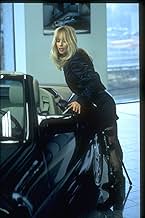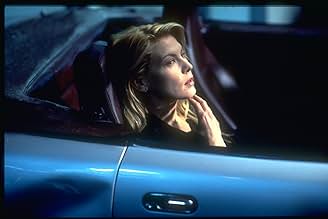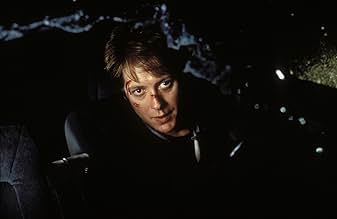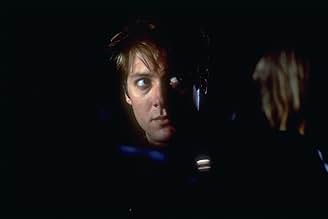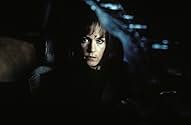Depois de sofrer um grave acidente de carro, um diretor de televisão descobre uma cultura subterrânea de vítimas omnissexuais que usam acidentes de carro e a energia sexual para rejuvenescer... Ler tudoDepois de sofrer um grave acidente de carro, um diretor de televisão descobre uma cultura subterrânea de vítimas omnissexuais que usam acidentes de carro e a energia sexual para rejuvenescer a vida sexual com sua esposa.Depois de sofrer um grave acidente de carro, um diretor de televisão descobre uma cultura subterrânea de vítimas omnissexuais que usam acidentes de carro e a energia sexual para rejuvenescer a vida sexual com sua esposa.
- Direção
- Roteiristas
- Artistas
- Prêmios
- 9 vitórias e 6 indicações no total
- Catherine Ballard
- (as Deborah Unger)
- Auto Wreck Salesman
- (narração)
- (não creditado)
- Man in Tattoo Parlor
- (não creditado)
- Direção
- Roteiristas
- Elenco e equipe completos
- Produção, bilheteria e muito mais no IMDbPro
Avaliações em destaque
Car crashes are a group of fetishists' thing to get off on. Some re-stage famous fatal ones: Jimmy Dean's, Jane Mansfield's. The car crash fetish ring leader drives a town-car like JFK was assassinated in.
Holly Hunter is extremely surprising as she plays a bisexual car crash fetishist physician who is way into having sex in cars; most especially after near crashes.
I don't know how this film got away with a R rating! But, I'm glad it did! It's a scorching hot sexy motion picture with one heck of a deviant plot. I bet even director John Waters liked this one. . . .
Surprisingly, there is romance in the movie. Spader & Unger stay together throughout all other crash scenario flings. The most fascinating thing about Cronenberg's "Crash" is how true to life it is & was in Seattle, when it first came out.
"Crash" is a remarkable study of fetishism. That's why it is not pornographic. Yes, the numerous adult sex scenes are extremely graphic; but, Cronenberg prevents the subject matter from being degraded into pornography.
With an amazing star cast, "Crash" not only was, but still is, one of the most controversial movies today. Doubtless some of the audiences have to ask themselves, "Are there really people like these?" The answer is overwhelmingly, indeed there are. Cronenberg & cast was the group brave & brazen enough to get real about human sexualities.
Even in the midst of frenzied lovemaking, the characters remain distant, their voices quiet and abstracted, their gazes directed inward. These are people who have been told all their lives by their culture, by TV and movies, that sex is, on the one hand, the most perfect form of communion and connection with another human being; and, on the other hand, that it is the ultimate in transcendent and transformative experiences. Instead, they discover to their horror that even during sex they still feel nothing. They crave connection, they are starved for a glimpse of transcendence, but no matter what they do, no matter who they do it with or how often, while their bodies may feel passion, their minds and hearts remain cold and empty.
In the more recent movie Pleasantville, the Jennifer/Mary Sue character is unable to feel anything either, and remains stubbornly black and white no matter how much sex she has, until her brother suggests that "maybe it isn't the sex" that is the key to moving from black and white to color, from passionlessness to feeling. Unfortunately, in Crash, there is no one to suggest to David and Catherine Ballard that maybe it isn't through sex that they will find the transformation and connection they are craving. So they instead seek more and more extreme forms of sexual stimulation, only to be disappointed again and again.
James is hurt in a car crash, and during his stay in the hospital he meets Helen (who was in the other car) and later Vaughan, a man who like James and Catherine is in desperate search of feeling, only he looks for it in the violence of car crashes. With Helen, at first James, then Catherine too is drawn into Vaughan's world, where sex and death (eros and thanatos for you Freudians) meet in the twisted metal of wrecked cars and the mutilated bodies of the victims of fatal car crashes and the survivors of near-fatal ones.
They attend staged recreations of famous car crashes, like the one that killed James Dean. They have sex in crashed cars, and start touring crash sites on the freeway as a form of foreplay. They begin to watch films of crash tests and fatal race accidents like other people would watch erotic films, and to have sex with people whose bodies have been mutilated by car crashes.
But not even the horror of mutilation or the adrenaline rush of near-death experience can lend James and Catherine's desperate coupling the depth of feeling that they so desperately crave.
Like all the people who buy expensive automobiles to give them a feeling of power and independence, only to discover that no matter how snazzy their car is, they still feel powerless and unhappy, James and Catherine have bought into one of our culture's Big Lies, that sex is the answer. This film shows us that it is not.
The plot:
A sexually frustrated couple starts experimenting with the outlines of anonymous sex. It is the husband James Ballard (James Spader) who gets into a car crash with Dr. Ellen Remington (Holly Hunter) and her husband. They crash frontally and both Ballard and Remington are seriously injured. Remington's husband dies while being launched from his seat through his own windshield into Ballards. Ballard ends up in the hospital, traumatized, trying to recover from his injuries. He gets into deeper contact with Helen Remington. Their mutual Crash-victim status brings them closer together, ultimately delivering them into the sump-oil-soaked world of the pathological Vaughan (Elias Koteas). Renegade scientist and leader of a strange subterranean group, Vaughan is only able to achieve sexual release by crashing into people on the motorways surrounding Heathrow airport. Getting sucked into his world, Ballard becomes obsessed with car crashes, and dives into the illegal world of "thrill seeking" and raw and hard (but mostly cold) sex.
The review:
To be quiet honest "Crash" is a very underestimated picture. First of all there are a serious amount of people who thought that the subject was laughable, and not to be taken serious, for how could you take something like this serious ?
After crashing your car and being injured, having sex with the victim of a car-crash ?
Apart from the post-traumatic stress that can appear after such an incident it also triggers a lot of adrenaline, which is almost a self produced drug. Cronenberg cuts a subject which is still very much of a taboo, the "thrill seeking taboo". You got a lot of so called thrill seekers now these days, which can result into ghost riding on the freeway, climbing on buildings without security etc. All in all the thrill seek element isn't that original.
This is where Cronenberg has looked for a thrill that rushes into a perverse sexual outburst. After the shock of crashing into a car, the adrenaline, the rush of the experience becomes so real, you feel so alive that you need to let it all out, which comes into the act of "making love". Cronenberg is trying to paint the audience a picture of an event like this.
Based on J.G. Ballards novel "Crash" which was quiet detached and cold, the director follows in style with the dark freeways of Canada, showing that even in your car you are not always save, and how a car can become the ultimate "drive" for pleasure. The problem with this film (like many others) is that it is so far out there that you either hate it or love it. The pacing is rather slow in the beginning and its hard to get into, if you don't understand the psychology that lies underneath the dialog. The movie has a solid script but the subject and material is not accessible for everybody. James Spader who often (he almost could be a stereotype) plays sexual frustrated protagonists ("Sex,Lies,and Videotapes", "Secretary", "Speaking of Sex") delivers a terrific performance here. His distant and alienated acting fits perfectly into the dark en and sensual story, and doesn't come as a insincere or "over the top". Some people felt that Koteas and Hunter performances where a little flat, but they have just the balance between low key and an over the top performance (Koteas more than Hunter). You got to keep in mind that these people are already deranged from the beginning. What you see is simply a drop falling into bucket that is overflowing.
The use of light and shadow is very subtle and excellently done by cinematographer Peter Suschitzky. He really knows how to pull you into a certain world, that LOOKS like ours but feels very different. In any case I can recommend the movie if you want to watch something different. A lot of people will not understand the weight this film carries, and therefore this movie will be underrated, or simply will be put aside as boring or unrealistic. THIS IS A MISTAKE,... don't put it away, watch it, and feel the awkwardness. The result ?
"Humans really are quiet weird creatures..."
The film deals with people who get sexual aroused by automobile accidents and the pain and suffering such wrecks cause. I suppose anything is possible and such people may exist, but CRASH takes it one step further and suggests that there is this cult of individuals who somehow network to fulfill their fantasies of motorized mayhem. Two such characters are played by Holly Hunter and James Spader. In a most grotesque parody of "meeting cute" the two encounter each other when he crosses the center line and smashes head-on into her car, killing her husband and apparently getting her hot and bothered in the process. Hunter's Helen is already into smashup sex, so, after a stay in the hospital, the grieving widow naturally rushes Spader -- playing James Ballard, the author of the original novel -- into her small band of bumper car aficionados.
In addition to being wreck 'n' roll fanatics, the people must also be incredibly rich. They like to recreate infamous celebrity auto accidents, such as James Dean's roadside death. For instance, to do so, they have to buy or recreate not only a replica of Dean's rare 1955 Porsche Spyder, but also an almost equally rare 1950 Ford coupe that was the other car involved in the crash. With these and a variety of other new and used cars, we're talking about thousands, perhaps hundreds of thousands of dollars for autos destined to be demolished in the name of foreplay. Talk about expensive quickies. A couple of tickets to a demolition derby would be far more economical -- and a virtual orgy.
Of course, the film isn't really about auto eroticism; it is about sexual obsession in general. The fetish in question could have been about anything that inspires abnormal lust. The characters could have been turned on by, say, internet porn, gambling, bungee jumping, farm animals or jiggling Jell-O molds. But, gosh darn it, car wrecks are so much more photogenic. It doesn't seem to bother the filmmakers that they are perpetuating a correlation between sex and violence, because, well, they apparently believe such a link already exists. Nor do they seem to be aware that they are undermining their own efforts by building an oh-so serious drama around a ludicrously grim (and lame) joke.
As such, the insipidness of the story is accentuated by the pomposity of the storytelling. Director David Cronenberg approaches the story as though he were Igmar Bergman directing PERSONA. Other than a few lapses, the film is cold and lifeless and empty; though it is somewhat appropriate that a film celebrating a sexual obsession with automobiles would depict sex as an utterly mechanical act. Cronenberg and crew do slip up a couple of times and inspire moments worthy of laughing out loud. One scene in particular is hilarious: Hunter and several others are lounging around watching videos of auto crash tests like they are watching porn videos; One particularly messy smash up prompts Hunter to excitedly demand that it be shown again in slow motion. Crash dummies watching crash dummies, as it were.
There is an unwritten rule of movie sex: If films featuring explicit sex are fun and comic, then it is pornographic; but if the sex is joyless, degrading and dispassionate, then it is art -- or, sex as something good is dirty; sex as something bad is honest. It is this simplistic, neo-puritanical attitude that makes films like CRASH so insultingly hypocritical: Make a big deal about filming graphic, lurid sex scenes, then condescendingly shake one's finger at the audience to remind them how perverse such activity is. It's like slipping an alcoholic a drink in order to self-righteously chastise him for being a drunk.
Had the filmmakers shucked the smug moralizing and openly played the material as sly satire, perhaps CRASH could have been a sharp commentary on modern romance, both between people and with their cars -- speeding as flirtation, road rage as rape, reckless driving as masturbation, the head-on collision as the one night stand; marriage as the aftermath of roadside carnage. But I don't think the film has the courage or the intellect to explore such themes. The film plays it safe, giving us a tale of obsession where the obsession is devoid of the thrill, the energy or the naughtiness of actually giving in to an impulse. It's an addiction without a high, but worse no expectation of there being a high. Here is a film that wants us to identify with a psychological quirk that is, to say the least, ridiculous, but it doesn't even make the effort to frame the quirk in a realistic fashion. How are we to care one way or the other -- emotionally, dramatically, socially or even clinically -- about people the film itself seems to regard as emotionally dead freaks?
CRASH thinks it is speeding recklessly down uncharted roads, but it is up on blocks, spinning its wheels and destined for the junkyard.
But - and let's get real for a minute - this is a film about people who are turned on by car crashes! Now, what the hell is that all about? If you ask me, the film is trying to say something about the need for transgression in an age with no real taboos - so its characters push at an endlessly receding door, until in the end only death itself can offer a way out. The problem is that the film suffers from the same problems as the world it portrays - these people have no moral rules, so their actions carry no implications beyond themselves - which leaves us with an idea, with happenings, but no narrative "drive" as such. Without anything to set against their nihilistic desires, 'Crash' coveys no sense of tragedy; just driving around in cars, with sex.
Você sabia?
- CuriosidadesSex scenes between James Ballard and his secretary were filmed but cut because director David Cronenberg felt the actors' chemistry was too good, contravening the nature of all the other relationships in the film.
- Erros de gravaçãoAfter Vaughan repeatedly crashes the left front bumper of his Lincoln into a junker James Ballard is sitting in, causing major damage to the bumper and the lights, Vaughan is soon shown driving on the highway with no damage to the bumper and both left lights operational.
- Citações
[Last lines]
James Ballard: Katherine, are you all right?
Catherine Ballard: James. I don't know.
James Ballard: Are you Hurt?
Catherine Ballard: I think I'm all right...
[James starts groping and kissing her]
Catherine Ballard: ... I think I'm all right.
James Ballard: Maybe the next time, darling. Maybe the next time.
- Versões alternativasAccording to Issue 58 of Film Ireland magazine, the Irish censors imposed 35s worth of dialogue cuts on the cinema release - this affected the sex scene where Catherine fantasizes about Vaughn to James. It's speculated this was actually done not due to the content, but to dissuade the distributors from submitting the uncut version on video (which could cause controversy in a less restricted environment) - however, all video releases are uncut and still rated 18.
- ConexõesFeatured in Late Review: Censorship and Cronenberg 's Crash (1996)
Principais escolhas
Detalhes
- Data de lançamento
- Países de origem
- Idiomas
- Também conhecido como
- Crash: Extraños placeres
- Locações de filme
- Empresas de produção
- Consulte mais créditos da empresa na IMDbPro
Bilheteria
- Orçamento
- US$ 9.000.000 (estimativa)
- Faturamento bruto nos EUA e Canadá
- US$ 2.664.812
- Fim de semana de estreia nos EUA e Canadá
- US$ 738.339
- 6 de out. de 1996
- Faturamento bruto mundial
- US$ 2.678.710
- Tempo de duração
- 1 h 40 min(100 min)
- Cor
- Mixagem de som


